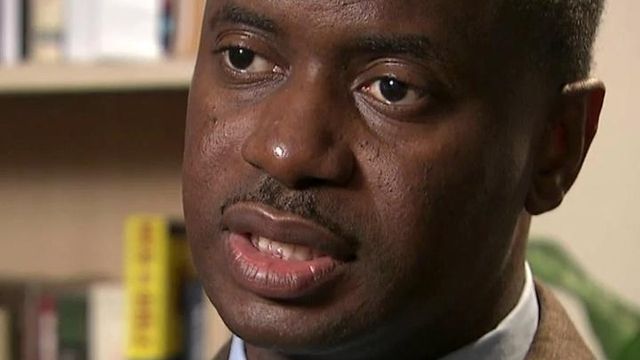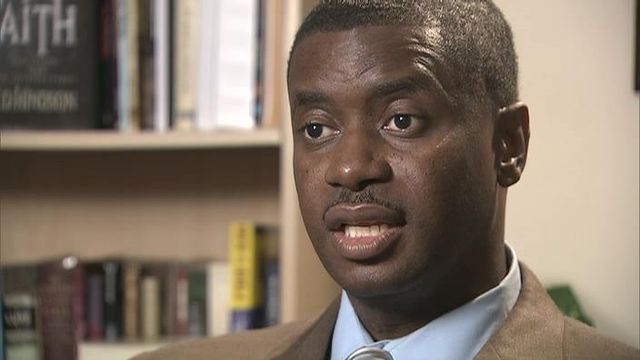Freed Wilson man: I thought the justice system would protect me
A Wilson man who spent six years in a Georgia prison for a shooting he maintains was self-defense says he feels failed by a justice system that should have protected him.
Posted — Updated"I thought I did what was right by the law, and I thought the judicial system would protect you if you did something similar to what I did," said John McNeil, who returned to Wilson Feb. 13 after pleading guilty to voluntary manslaughter in the Dec. 2005 shooting of Brian Epp.
"You get angry. You get mad. You get upset. But through time, time heals everything," he said. "It’s an emotional time for me, having been put in a predicament or situation like this. I don’t think there really are words to explain how I feel or what I went through. I can tell the story, people can read the story, but you actually don’t know until you walk in my shoes."
McNeil has never denied the shooting, but says he was protecting himself and his family.
McNeil said his son called to say that Epp, armed with a box cutter, was threatening to kill him at the McNeils' home in an upscale Atlanta suburb. When Epp refused to leave his property, McNeil said he fired a warning shot.
Then Epp came toward him. The second shot was lethal.
"I feel I was justified in what I did. I protected my son and protected myself," McNeil said.
After hours of interrogation and interviews with McNeil's son and an eyewitness, investigators ruled the shooting self-defense and took McNeil home.
But, nine months later, McNeil was indicted on a murder charge. To his surprise, he was convicted.
"The jury, they kept asking a lot of questions. They weren't even sure," he said. "I don't think that they were even aware it was self-defense. The reading of what the law says and what the law actually means ... I don't even think they truly understood what was at hand."
McNeil was sentenced to life in prison, an injustice he says he still struggles to put into words.
"For my close friends that I depended on and depend on even to this day, I had to think of them, because even though I was in there and they were free, my spirit also let me know that they were in there with me," he said. "To be in there on the days that weren’t so good and my emotions were down and my spirit was down, I fed off of their energy. I fed off of their spirit.
"When you're in a place and you know without a shadow of a doubt that you shouldn't be there ... the only thing you can do is just pray daily that one day the doors will open."
It took six years for those prayers to be answered.
In September, thanks to the tireless efforts of McNeil's wife, Anita, and intervention from NAACP leaders in Georgia and North Carolina, a judge ruled that McNeil was entitled to a new trial, in part because the jury was not properly instructed on a person's right to use force to defend himself, his home or another person from violent attack.
But time was running out. Anita McNeil wasn't just fighting for her husband's freedom, she was fighting for her life. Breast cancer, exacerbated by the stress of the case against her husband, had weakened her and the cancer was spreading to her bones.
"This was a stressful, stressful situation. Our lives changed dramatically," McNeil said. "She needed me there ... whatever it took to get there, to be by her side, I was willing to do it."
That meant pleading guilty to a lesser charge.
"Not to say that we believed in it ... (but) we considered the deal predicated on me getting there and me getting out," McNeil said. "Because she needed me more and my sons needed me more than I needed to be inside a place that I was wrongly convicted and wrongly thrown into a prison."
The deal didn't pan out in time. Anita McNeil died on Feb. 2.
"My wife, she's a beautiful soul. She has touched a lot of people and she stood for something. She cared about people. She cared about me," he said. "I felt like I lost everything and at that point, I said, 'God, you've got to do this because I can't do it anymore.'"
Ten days later, McNeil pleaded guilty to voluntary manslaughter to end an appeal pending before the Georgia Supreme Court. He was sentenced to 20 years and was given seven years credit for time served. He will serve the remaining 13 years on probation in Wilson with his family.
"The day that I actually stood before the judge to say I was guilty, it was a sensation that ran through me that I can't even describe," he said.
The NAACP has pledged to keep fighting until McNeil is fully exonerated. In the meantime, he's focused on a promise he made to his wife – to rebuild a life for himself and his two sons.
"She said she'll be looking down, if it was that she would leave before I go out," he said. "She'll be looking down upon me and my sons and we'll make her proud."
• Credits
Copyright 2024 by Capitol Broadcasting Company. All rights reserved. This material may not be published, broadcast, rewritten or redistributed.






